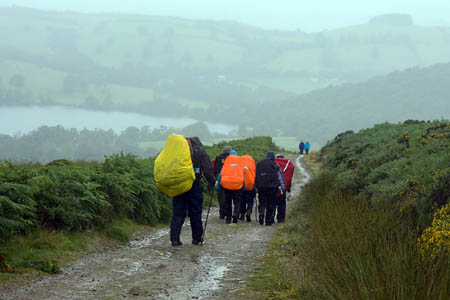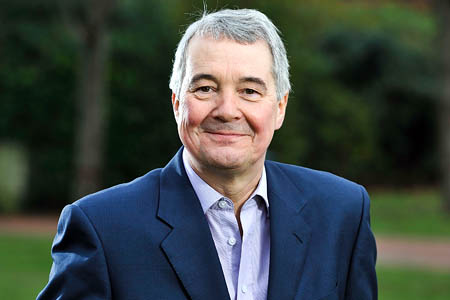The head of one of the country’s leading youth-activity organisations has backed a former Home Secretary’s plan for a national volunteering programme for young people.
But Peter Westgarth, chief executive of the Duke of Edinburgh’s Award, cautioned that any scheme should not try to ‘reinvent the wheel’ and pointed out more than a quarter of a million youngsters are already volunteering as part of their ‘DofE’.
And many of today’s keen outdoor enthusiasts were introduced to delights of the national parks and the joys of reaching camp after a hard slog through some of Britain’s best scenery during their expedition.
Labour MP David Blunkett made his call for a national volunteer programme in a recent article for the Daily Mail in the wake of the alarming riots and civil unrest that occurred throughout the country.
Mr Blunkett said the Government should set up a system to offer all 16- to 25-year-olds the opportunity to have a nine-month volunteering stint, with paid-for accommodation and expenses and a small ‘stipend’.
In the case of the US, he said, gang culture and gun crime have noticeably declined in some cities where volunteering programmes exist.
“What I want to do is to launch a programme that would operate on a nine-month basis, and be geared towards social, educational and environmental programmes, seeking both to transform local communities and to provide new experiences for youngsters that would build their confidence and self-esteem,” the former Home Secretary wrote.
“The aim would be to promote the ethics of personal responsibility and self-discipline: in short, the qualities that make decent citizens.”
Mr Westgarth, in reply, said: “Volunteering is a key component of the DofE. We calculate the value of young people’s time, dedicated to supporting their local communities, at £21m a year.”
While the best known aspect of the Duke of Edinburgh’s Award is ‘the big walk’, where participants tackle a self-sufficient expedition over a number of days, Mr Westgarth is keen to point out the DofE is about more than just tramping across wild terrain with a big pack.
“The DofE works with and through the most comprehensive network of youth and community organisations in the UK,” he said.
“Our experience of working with the complete range of ability and background – prisons to private schools, army cadets to Foyers – confirms to us that David Blunkett is correct in his view that young people will respond positively to opportunity presented to them by enthusiastic, motivated and skilled adults.
“Volunteering is also at the heart of the DofE network. Some 45,000 adult volunteers give over 2 million hours of their time each year to support young people in their efforts. A very conservative calculation of the social value of their efforts is £15.25 million.”
A gold participant must, in order to qualify for the award, undertake a four-day camping expedition in difficult terrain. But they also have to spend a year taking part in unpaid volunteer work for an hour or so a week; take part in a physical activity over a period of months and also enhance their skills in activities such as music, creative arts, and science and technology. There is a further requirement to spend at least five days on a residential activity away from home.
The DofE, which has been running for more than 50 years, has seen more than 7 million young people take part in its activities. Its chief executive said it is a trusted mark of a youngster’s character. “The Duke of Edinburgh’s Award has built a reputation as a badge of high achievement by a young person,” he said. “It is that recognition that gives the DofE real currency and credibility for the young person leaving prison or their local school.
“It is trusted and valued by employers, higher education establishments and parents. We believe this should be embraced by politicians too and built upon as tried and tested, moving with the times, and continuing to extend access, inclusion and involvement.”

David Blunkett: volunteering programme should be integral part of growing up in Britain. Photo: www.workingwordpr.com CC-BY-ND-2.0
In contrast, David Blunkett pointed out the new National Citizen Service, launched this summer through 12 pilot projects at different locations throughout the country, had been poorly supported.
“The Citizen Service aims to promote a more cohesive, responsible society by encouraging 16-year-olds to undertake voluntary activities for several weeks during the summer, including two away from home,” he wrote.
“It has to be said that the take-up so far has been disappointing, with the Government failing to reach its target of 11,000 volunteers. This may well be because many teenagers have been asked to pay up to £99 to take part.
“The national volunteer programme needs to be much bigger in scale, with more powerful backing from Government departments. It should become an integral part of growing up in Britain, a rite of passage into adulthood, just as National Service used to be for the 1950s generation.”
Peter Westgarth said he is keen the DofE’s impact is not overlooked.
“I am also keen to see that Government is not encouraged to ‘reinvent the wheel’ as has been done in the past,” he added.
“There are excellent organisations and programmes of activity in existence, most of them linked through the DofE network, that can do more if given the encouragement and resources.”
While wishing Mr Blunkett success with his scheme, he points out the DofE has provided a structure to encourage, facilitate and recognise volunteering by young people for more than 50 years and has proven itself to be resilient to political change, financial constraints and fashion.
More details of the Duke of Edinburgh’s Award are on its website.
- Bob Smith is a volunteer Duke of Edinburgh’s Award leader


wongo
14 September 2011I and am sure many others are sick and tired of gesture politics from all and sundry. The pilot NCS schemes cost a fortune.
D of E is a proven success here and all over the world, all peoel have to do is endorse it and support it and help getting to harder to reach kids etc.
We dont need, want or desire anything else.
If it aint broke etc.
I have been involved for over 30 years in D ofE and can testify to the difference it makes.
How many D of E participants arrested in the riots? I bet very few if any at all.
The Piglit
15 September 2011Let's get shot of the D of E it's a lot of patronising reactionary and old hat. Let's have a young citizens "Green and Good" socialist militia which should be compulsory.
WARNING THIS COMMENT CONTAINS SATIRE
Margaret
12 December 2011The D of E has been excellent over its long history, but is its "reputation as a badge of high achievement" still justified as it pushes to increase the numbers and expand - is the experience being watered down.